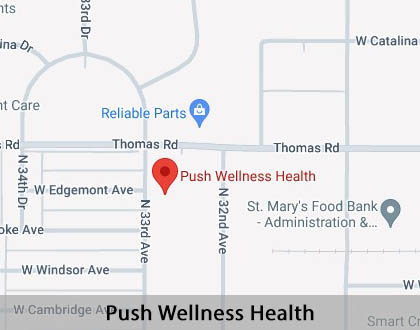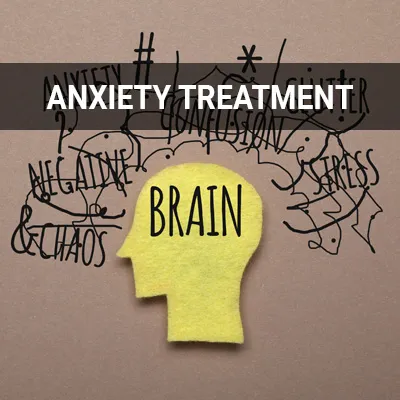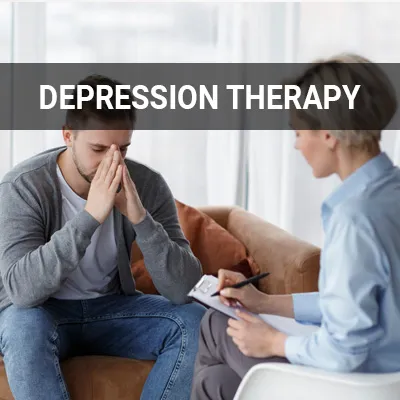Panic Disorder Treatment Phoenix, AZ
Panic attacks can be painful, frightening, and disorienting. Unfortunately, many people experience panic attacks regularly. Those with panic disorder often struggle with recurring attacks and increased anxiety. Panic disorder treatment can help ease these symptoms. Our clinic provides services for children, adolescents, adults, and seniors. We have specialized clinicians experienced in working with each age group.
Panic disorder treatment is available at Push Wellness Health in Phoenix. and the surrounding area. Our team works with patients to get to the root of their symptoms. We offer a wide range of services to ease anxiety and prevent panic attacks. Call us at (480) 737-4658 to learn more.
Understanding Panic Disorder
People with panic disorder suffer from severe episodes of anxiety. Many different circumstances can trigger their anxiety. Sometimes, panic disorder occurs alongside other anxiety disorders or phobias. These phobias or triggers may worsen panic disorders. Patients with panic disorder often became fearful of triggering another panic attack.
They might avoid certain people, places, or situations. As a result, panic disorder can be lonely and isolating. Fortunately, treatment can help ease these symptoms. Panic disorder treatment empowers patients to take control of their lives.
“Panic disorder treatment empowers patients to take control of their lives.”
Understanding Panic Attacks
People with panic disorder experience chronic panic attacks. During a panic attack, they might experience physical symptoms including:
- Chest pain
- Chills
- Dizziness or numbness
- Flushed skin or hot flashes
- Rapid heartbeat
- Shaking or trembling
- Shortness of breath
- Sweating
Panic attacks can also trigger psychological symptoms, including a sense of impending doom, fear of death, illness, or injury, and a sense of detachment.
During a panic attack, many people fear having a heart attack. Some seek out emergency medical care or a cardiovascular checkup. Often, patients feel embarrassed or ashamed after learning they have had a panic attack.
The symptoms of panic attacks and heart attacks can be similar. Unlike heart attacks, panic attacks are not life-threatening. However, they can be intensely uncomfortable. If a patient's suspects a panic attack, they should not hesitate to seek medical care. A therapist can help ease their symptoms with a proper diagnosis and guidance.
“Unlike heart attacks, panic attacks are not life-threatening.”
Causes of Panic Disorder
Researchers cannot pinpoint what causes panic attacks. The condition appears to have a genetic component. If patients have family members with anxiety, they might be more likely to develop panic disorder. Some patients might be born with increased sensitivity to hormones like adrenaline. These factors could increase the risk of panic disorder.
Panic disorders might also have an environmental basis, and many people develop panic disorders after a traumatic experience or major life change. Stress can play a role too. Patients with health problems, have suffered from job loss, or have gone through divorce sometimes develop panic disorder. New parents might also be at a higher risk of panic disorder. While panic attacks can be excruciating, they are not life-threatening. Panic attacks do not appear to cause heart problems or other serious health problems. However, they can greatly affect a patient's quality of life.
People with panic attacks often miss weeks of school or work. They may fall behind and struggle to meet their obligations. Some people may even turn to drugs or alcohol to numb their symptoms. Without treatment, patients may develop suicidal thoughts or self-harming behaviors. Those who experience panic attacks should seek guidance from a qualified professional who can determine whether they have panic disorder. They also recommend treatments to reduce one's risk of future panic attacks. Treatment can ease panic disorder symptoms and make them more manageable.
“Treatment can ease panic disorder symptoms and make them more manageable.”
Check out what others are saying about our mental wellness services on Yelp: Panic Disorder Treatment in Phoenix, AZ
Diagnosing Panic Disorder
A medical provider may perform a complete physical exam as part of one's evaluation. During this exam, the provider will look for problems with the heart or lungs. They may also check one's hormones and thyroid function. Sometimes, hormonal imbalances can trigger symptoms that mimic panic disorder. Primary physicians often refer patients to a therapist if their symptoms signify a mental health disorder. Patients can also expect to receive a complete psychological evaluation. The therapist may ask them to describe their symptoms. They will also ask how often the patient had panic attacks, when their symptoms started and how they have affected their life.
Drugs and alcohol can worsen panic disorder symptoms. During one's evaluation, the provider may ask how often they use these substances. Patients must be truthful about drug and alcohol use. Providers depend on their patients to provide accurate information, and they use this feedback to develop a personalized treatment plan.
“Sometimes, hormonal imbalances can trigger symptoms that mimic panic disorder.”
Questions Answered on This Page
Q. What causes panic disorder?
Q. How is panic disorder diagnosed?
Q. How is panic disorder treated?
People Also Ask
Panic Disorder Treatments
Many people with panic disorder find medication helpful. For example, if diagnosed with panic disorder, one's provider might suggest a selective serotonin reuptake inhibitor (SSRI) or serotonin-norepinephrine reuptake inhibitor (SNRI). These medications support the movement of neurotransmitters within the brain.
Neurotransmitters help the brain determine when to produce certain chemicals. They also regulate physical responses. Many people with panic disorders have a chemical imbalance within their brains. Medication can help support healthy brain chemistry. Cognitive-behavioral therapy (CBT) can also relieve anxiety and panic symptoms. During CBT, patients identify unhealthy or inaccurate thought patterns. They explore their emotions, motivations, fears, and desires.
CBT can also teach patients to manage triggering or upsetting situations. After CBT, patients often feel better able to manage their panic symptoms. Many patients achieve results by combining medication with CBT. Medication can restore healthy brain chemistry, while CBT encourages healthy thought patterns; these treatments work together to support a holistic recovery.
Other treatment modalities can also help patients manage their panic disorder. A therapist can discuss various treatment options in more detail during a consultation.
“Many patients achieve results by combining medication with CBT.”
Frequently Asked Questions
Q. Are panic attacks and panic disorder the same thing?
A. Many people have a panic attack during their lifetime, but not everyone who experiences a panic attack has panic disorder. Panic disorder occurs when a patient has recurring panic attacks and struggles with an ongoing fear that they might have other attacks in the future. Your therapist can determine if you have panic disorder.
Q. Are panic attacks dangerous?
A. While not life-threatening, panic attacks can be frightening. Unfortunately, the symptoms of panic attacks and heart attacks are very similar. When in doubt, seek an evaluation.
If you experience a panic attack, a healthcare provider can help. They may administer medication to provide temporary relief. Short-acting medications can stabilize your body during a panic attack, and a therapist can continue treatment afterward.
Q. What should I do if I have a panic attack?
A. During their first panic attack, many people seek emergency medical care. But if you have had panic attacks before, you might be able to recognize your symptoms and manage them at home.
Call your healthcare provider or a trusted support person. If possible, go to a quiet area and sit down for a while. Take deep breaths and remain hydrated. In most cases, symptoms pass within 15 minutes. When in doubt, seek medical guidance for further panic disorder treatment.
Q. How long does a panic attack last?
A. Most patients report that panic attacks last for about 15 minutes. However, some symptoms may linger for hours. Panic attacks often occur alongside other disorders, and it can sometimes be difficult to identify the source of a patient's symptoms. A mental health professional can provide a complete evaluation.
Q. Is panic disorder common?
A. Panic disorder affects up to three million Americans during their lifetime. About two-thirds are women, but panic disorder affects men, too. Panic disorder can strike people of all ages and backgrounds. No matter your age or gender, panic disorder treatment can help.
Change Is Possible – Call Us Today
Life isn't always easy. Are you struggling? Are you looking for a highly personalized and professional approach tailored to your individual needs? Instead of waiting around, call us today. You should know that there is hope for a better tomorrow.
Definitions
Learn More About Panic Disorder Treatment
Panic disorder can take a toll on your quality of life. Fortunately, treatment can help. Our team provides personalized care to support your recovery. We work with patients every step of the way to ease anxiety and prevent future panic attacks.
If you need help managing your panic disorder, let Push Wellness Health in Phoenix help. Call us at 480-737-4658 to learn more about our services and policies.
Helpful Related Links
- Agency for Healthcare Research and Quality. Agency for Healthcare Research and Quality. 2024
- American Psychiatric Association (APA). American Psychiatric Association (APA). 2024
- Psychology Today. Psychology Today. 2024
- The American Board of Professional Psychology. The American Board of Professional Psychology. 2024
- The American Journal of Psychology. The American Journal of Psychology. 2024
- The National Association of Behavioral Healthcare. The National Association of Behavioral Healthcare. 2024
About our business and website security
- Push Wellness Health was established in 2022.
- We accept the following payment methods: American Express, Check, Discover, MasterCard, and Visa
- We serve patients from the following counties: Maricopa County
- We serve patients from the following cities: Phoenix, Tolleson, Sun City, Paradise Valley, Gilbert, Chandler, Tempe, Mesa, Queen Creek, Scottsdale, and Glendale
- Norton Safe Web. View Details
- Trend Micro Site Safety Center. View Details
Back to top of Panic Disorder Treatment










